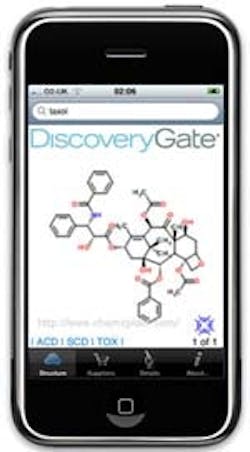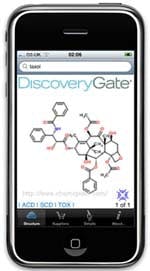iPhones and iPod touch devices have moved well into the realm of mini computers, with applications to simplify, organize, and entertain. Besides applications for entertainment and business purposes, there's been a proliferation of apps for medical use, and they’re in development for laboratory uses as well.
How about the plant? There's an app called ClearTune that allows you to tune your musical instruments. How about one that allows you to calibrate your industrial instruments? There are issues of precision and compliance to deal with first, of course, but who knows?
Pharma lab applications are already springing up—at least there’s one on the market. Symyx has recently introduced ChemMobi, an iPhone app that gives “on-the-go scientists access to over 30 million chemical structures, chemical properties, suppliers and other information.”
“We had a [software] developer looking for a side project,” explains Carmen Nitsche, VP of Content for Symyx Software. “We’ve been pushing content via the web all year, and we can apply that to almost any platform.”
As for the plant? Apps for safety, whether for a lab or manufacturing environment, figure to have the most uptake, Nitsche says.
There will be a huge boom for pharma iPhone apps in the next few years, predicts Dean Calhoun, president/CEO of Affygility Solutions. Those for shop-floor training will be big, he thinks. “One of the largest web-conferencing providers already offers an app to watch webinars from the iPhone,” he notes. As always, there will be concerns about the use of handheld devices in hazardous environments that require rated equipment.
iPhones or iPod touches could be used in many places where PC’s are impractical, says Kyle Brinkman, a validation project engineer at King Pharmaceuticals, commenting on our LinkedIn.com community. “Consider places where lab methods, SOP’s and batch records need to be but paper copies are not allowed (i.e , Documentum users can't print SOPs),” he says.
The issue of digital security remains, of course. “One approach is to have a built-in daily expiration date on downloaded files,” he continues. “This will ensure that the user has the version of the SOP/document that is in effect that day. Digital signitures on things like work orders and batch records could be applied at the time of upload from the iPod to the computer system.”
There may be industrial applications for iPhones, says Joe Granda, VP of Marketing for Syclo, a provider of industrial handheld platforms and applications. Syclo is working on some iPhone apps for 2010 which would benefit pharma, he says, but he sees limited use (or interest from Apple) for an iPhone in drug manufacturing environments. His point: The iPhone's most salient feature is its rich web browser, and you don't necessarily need (or want!) plant operators to be surfing the web.
Plus, Granda says, there are lots of really good ruggedized handhelds already on the market, for reasonable prices, and Apple would likely see more market potential on the sales side of pharma and leave the industrial side alone.
Know of an interesting iPhone application in pharma? Contact the author at [email protected].

